








At some point, technology and nature fell out of rhythm.

continued dedication to developing new, sustainable plant-based technologies is getting us back in rhythm with nature.


Vital magazine is a news and media resource managed by POET, the world’s largest producer of biofuels. Since 2008, Vital has provided readers with forward-thinking content that helps to advance an industry that provides renewable energy and bio-based products from the surface of the Earth. Vital seeks to educate readers about the state of the biofuels sector today and the breakthrough stories of innovation and sustainability of tomorrow by presenting a variety of insights and perspectives.
Each issue features in-depth, quality reporting on important topics, such as the fight against the climate crisis, innovation in agriculture, local and national policy landscapes and stories of the men and women advocating to advance bioethanol and other renewable bioproducts.
Vital by POET is committed to editorial excellence, along with high quality print production and distribution. In the spirit of its continued commitment to being good stewards of the environment, POET is proud to produce Vital using recycled paper when printed.
Additional reporting can be found online at vitalbypoet.com. The opinions and statements expressed by content contributors and advertisers in Vital are their own and do not necessarily reflect those of POET. Neither POET nor its third-party content providers shall be liable for any inaccuracies contained within Vital, or for any actions taken in reliance thereon.
Contact 4615 North Lewis Avenue
Sioux Falls, SD 57104
vitalbypoet.com
Direct all questions, comments and story ideas to: vital@poet.com
Advertising Information
605.965.2200
POET Communications
To Subscribe
Visit vitalbypoet.com to receive a digital magazine
C2/23/C4 | POET
Growth Energy
of Change
Vital is published quarterly by POET, LLC and other individuals or entities. All materials within are subject to copyrights owned by POET. POET, JIVE, Dakota Gold, BPX, ProPellet, Nexpro and other associated designs and logos are registrations or trademarks of POET, LLC. Growth Energy is a registration or trademark of Growth Energy, a non-profit corporation organized under the laws of the District of Columbia. Any reproduction of all or part of any document found in Vital is expressly prohibited, unless POET or the copyright owner of the material has expressly granted its prior written consent to so reproduce, retransmit or republish the material. All other rights reserved. For questions, contact the POET legal department at 605.965.2200.
The opinions and statements expressed by content contributors and advertisers in Vital are their own and do not necessarily reflect those of POET. Neither POET nor its third-party content providers shall be liable for any inaccuracies contained within Vital, or for any actions taken in reliance thereon.

GEA Group
©2022 POET, LLC. All rights reserved.
08 | Taking Above and Beyond to the Next Level
From joining the POET team, to hosting the President, to hiring a new General Manager, POET Bioprocessing – Menlo’s team has seemingly done it all
| 2022 Midterm Elections: The Race is On!
| Proud to be an American Fuel
Biofuels industry employs more veterans than any sector in energy industry
| America’s Energy is Growing in Iowa’s Fields
| One Small Step for Man, One Giant Step for Biofuels
How ClearFlame Engine Technologies could change the trucking industry
| Never Satisfied Class of 2022
Meet the recipients of this year’s POET Never Satisfied Scholarships
| In Sight
By Jeff Broin
| Mechanics Corner
Automotive advice from the Under the Hood radio show
| Farm Fresh By Brian Hefty
| Out Of Left Field
By Scott Johnson DEPARTMENTS
| Get Biofuel
| Bioproducts of POET
| People of POET

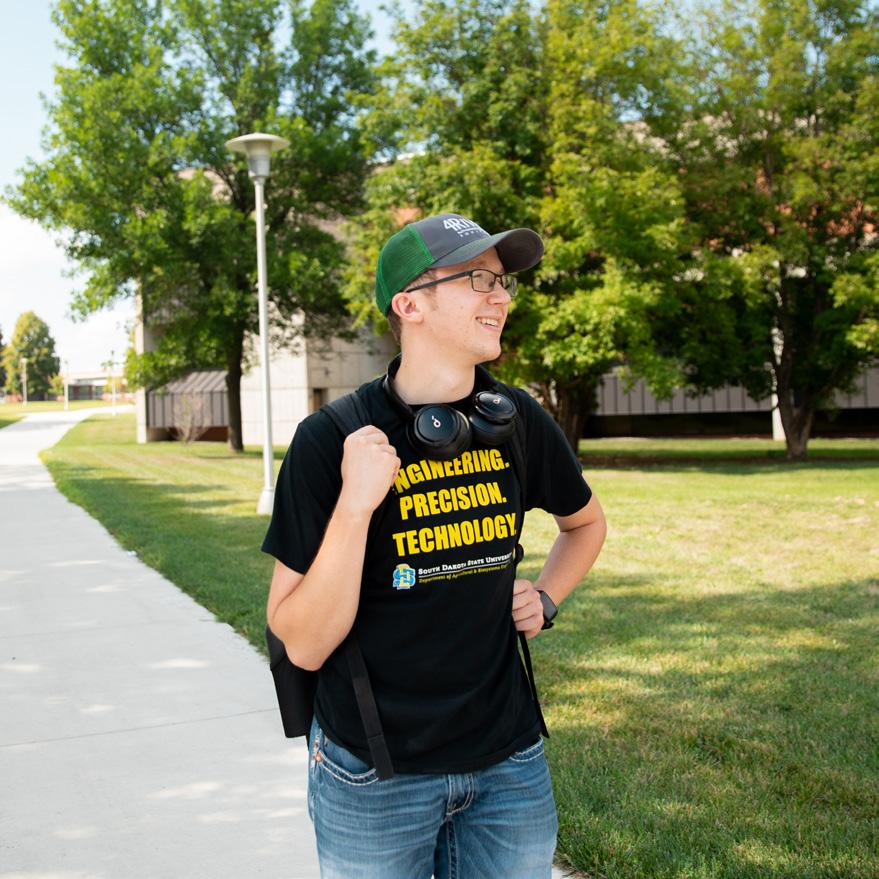

Milestones, by nature, cause us to reflect. They provide a rare occasion to look back upon the challenges, successes, and people that got us to where we are.
This October, POET will celebrate one such milestone: our 35th anniversary.



As I reflect on the last three and a half decades, I am truly humbled. What started as a small farm-scale bioethanol plant built to use my family’s surplus grain in Minnesota gave rise to a one-milliongallon-per-year facility in South Dakota and, in the years since, has expanded into the world’s largest producer of biofuels and a leader in bioproducts processing 7% of the U.S. corn crop.
From day one, I had faith that bioethanol would be a valuable tool for American agriculture. But when I moved to South Dakota — someplace I had never been — in 1987 to take the helm of a defunct bioprocessing plant, I could never have envisioned the scope of what POET would become.
At the time, I was a 22-year-old with a head full of big ideas, a lot to prove, and no idea what I was in for. I was on a small but worthy mission to turn a profit at that plant so I could put food on the table and a roof over my head. I had a white-picket-fence vision of the future: a modestly successful career, a place to call home, and hopes to raise a family.
I suppose I wanted what many of us want. It’s what they call the “American Dream.”

The American Dream represents the spirit of our country, the set of ideals upon which this nation was built. This philosophy that every person, regardless of who they are or where they’re from, has the opportunity to achieve their goals has been instilled in generations of American hopefuls.
But as I matured alongside this industry, so did my dream — not just for the company and my family, but for the country and, eventually, the world.
As POET grew, we quickly saw that we could do more than process some surplus grain; we could create a much-needed market for farmers and bring long-term profitability to the heartland. We could do more than design and build some bioethanol facilities; we could continuously improve the production process and develop cutting-edge technology that continues to evolve to this day. We could do more than make fuel and feed from corn; we could innovate an ever-growing suite of plant-based bioproducts and create a brighter future for everyone.
At POET, we’re not just dreamers — we’re doers. We’re trailblazers and innovators and champions for a better world, and we can attribute our success to the same hard work, tenacity, and good oldfashioned common sense that built this great country.
Building a global bioprocessing powerhouse from the ground up is nothing short of astounding. Yet, thanks to the many who dreamed and worked alongside me, here we are.
All those years ago, at our first plant, I said, “We hope that we will do this industry some good, and we think we will.”
Thirty-five years, tens of billions of gallons of bioethanol, hundreds of billions of pounds of DDGS, more than 80 biotechnology patents, 33 bioprocessing facilities, and over 2,200 world-class team members later — and I still feel as though we’re just getting started.

Not only do I believe we’ve done this industry some good, but we’ve also done a whole lot of good for the world and everyone in it. It’s been an incredible ride, and I’m grateful for every minute of it and every team member, investor, farmer, and supporter that have helped write the POET story.
Here’s to the next 35 years!

From joining the POET team, to hosting the President, to hiring a new General Manager, POET Bioprocessing – Menlo’s team has seemingly done it all
By Darrell BooneThe motto for the central Iowa town of Menlo, population 353, is “A town of few, and friend to all.” There, among the picturesque winding roads and rolling, corn-rich prairie plains, new POET Bioprocessing – Menlo General Manager Chris Morey is finding that motto means exactly what it says.
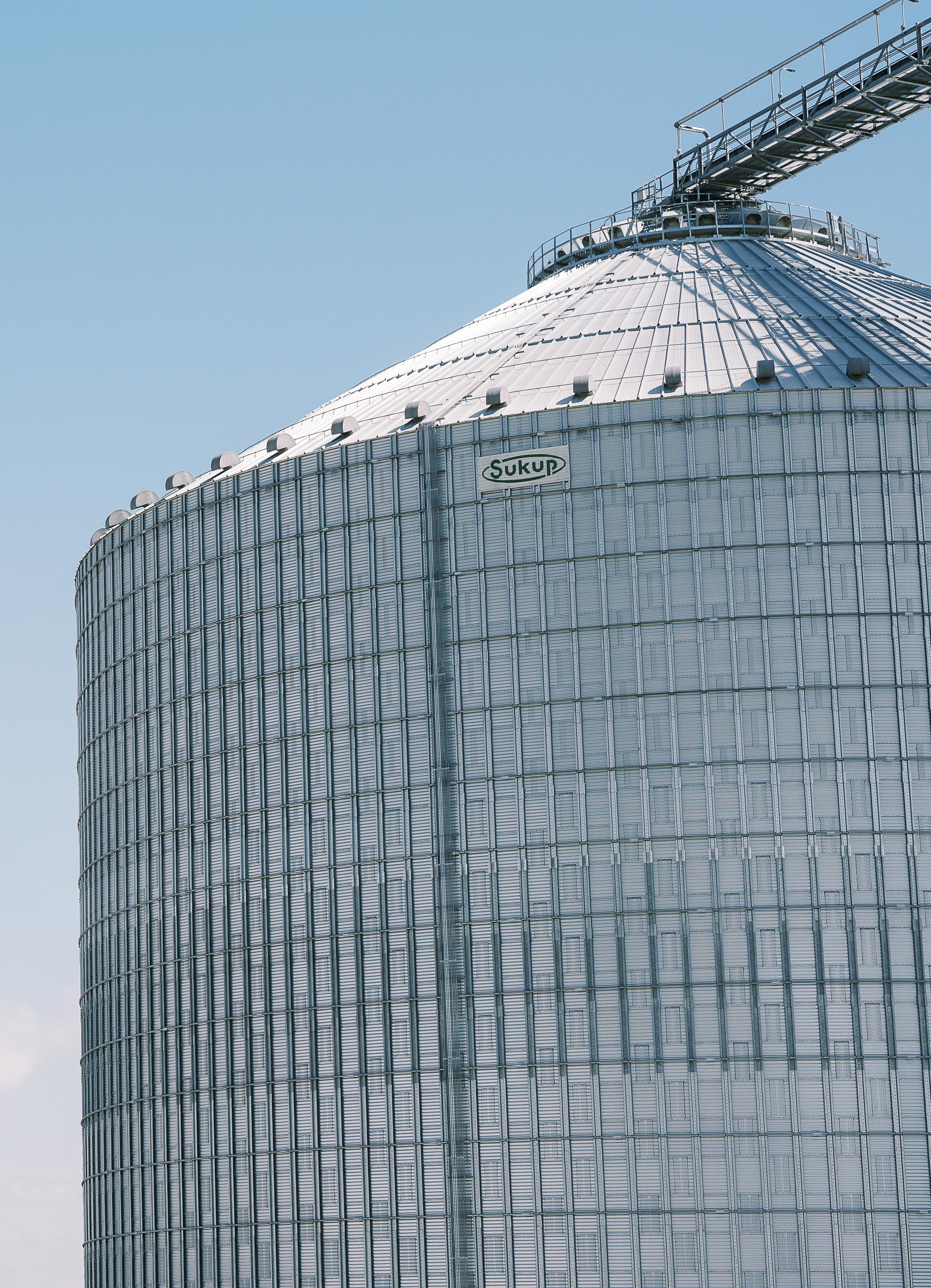
“The people here are just very nice, Midwestern folks,” he says. “They’re very welcoming and eager to meet new people. As I’ve made my way around town, I’ve gotten to know the fire chief and others who enjoy talking about the plant. It’s been good.”
Morey worked in the finance and research divisions at POET’s corporate office in Sioux Falls for eleven years. Moving to the Menlo area was an exciting transition not only for Morey but for his wife and two daughters as well.
Before he became general manager, Morey had the opportunity to see the Menlo team work together in fast-paced, high-pressure situations. President Biden visited POET Bioprocessing – Menlo this past April, giving the POET team notice of only two business days.
"A presidential visit means a lot of preparation work and the eyes of the country on POET,” says Morey. “The team pulled off an incredibly successful event, and I’m proud to be able to join a team as effective as this one. President Biden was the fourth president to visit a POET bioprocessing facility. So, as a whole, we’re not new to hosting a president, but it was definitely a once-in-a-lifetime experience for this team.”
While Morey is not new to POET, this is his first assignment as a general manager, and to say he’s excited is an understatement. Part of that includes looking forward to opportunities to continue building strong relationships within the community.
“We already have scholarships we support,” he says. “We support four area county fairs. We’re planning to donate some equipment to the Menlo Fire Department, as well as a number of other activities. But while it’s always good to give financial support, one of my goals is for us to stay active and involved in our local community.”
Big addition to the POET family
POET Bioprocessing – Menlo is one of six bioprocessing facilities that were acquired from Flint Hills Resources by POET in 2021. At an annual production rate of 132 million gallons of bioethanol, Menlo is one of POET’s largest bioprocessing facilities. But according to Morey, there is another feature of the plant that is “big.”
“We have what was, until recently, the largest grain bin in the world at 1.9 million bushels,” he says. “It’s affectionately known as ‘Mega Bin’ and is almost comically large. As I see it from my office window, it dominates the landscape.”
But Mega Bin aside, the thing that’s most exciting about Menlo to Morey is the opportunity to be a part of a team that is making a difference from the ground up.
“All of the outstanding things POET does — in the rural communities, for farmers, for Africa — all stem from operations in our plants. Being here is exciting to me.”
Chris Morey, General ManagerTop Right: Yolanda Raices, Quality Manager | Middle Right: Dave Wilson, Plant Manager
Bottom Right: Chris Morey, General Manager



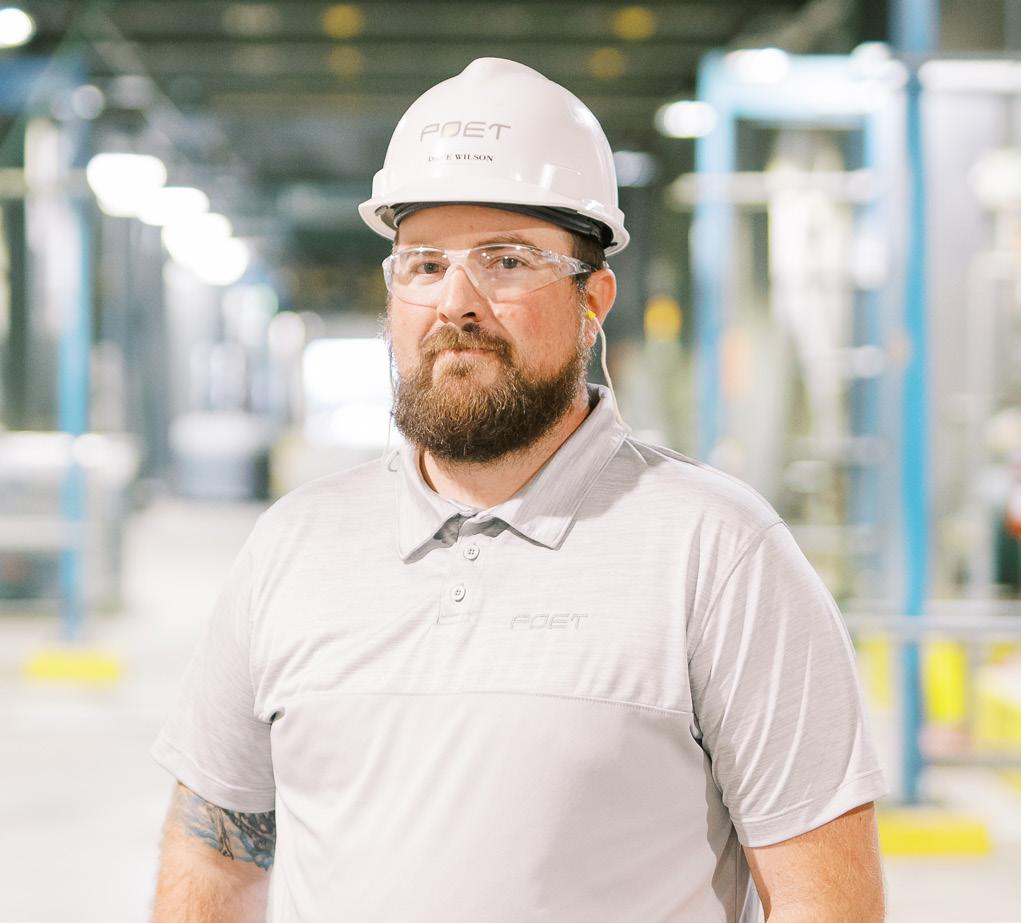
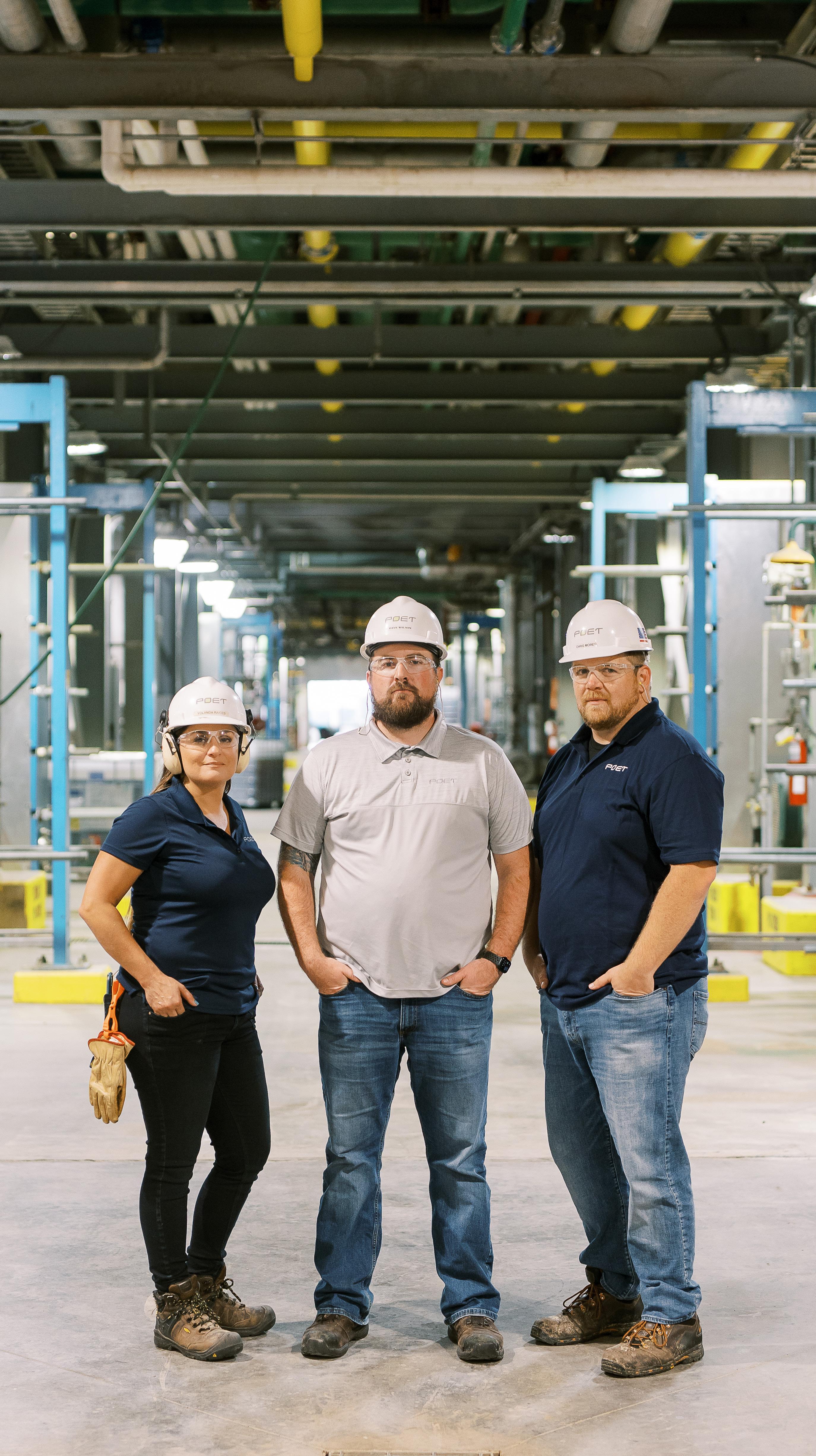
Morey describes his first weeks on the job as “drinking from a fire hose” but is enjoying getting to know the people and the job. He comes in the mornings to be present for the shift change and talks with team members from both shifts. He characterizes the workforce at the plant as a “generally young group, with a solid core of tenured team members.” It’s a good mix, with each group learning from the other. He’s proud of the team members’ work ethic and says they’re glad to be part of the POET family.
“They’re really excited to be part of an organization whose focus is on changing the world, creating bio-based solutions and growing rural economies,” he says. “Having the passion that POET brings for renewable fuels has really been refreshing for folks.”
“Working and enjoying what I’m doing”
Before there was a bioethanol plant at Menlo, Dave Wilson was there.
“I began in 2008 by working for a contractor who was building the concrete grain silos because it was close to my father’s farm,” he says.
When the plant opened, first as Hawkeye Growth, he applied for a job as a loadout operator. From there, he steadily worked up the ladder through a variety of positions to become plant manager in 2018 for what had then become Flint Hills Resources. He says that over that time, what he enjoys most about his job has evolved.
“Initially, I liked working with the grain, troubleshooting, and learning about the bioethanol business,” he says.
“When I came into a leadership position, I found what I enjoyed most was helping people grow, which is now my favorite part of the job.”
Dave Wilson, Plant ManagerOf the three companies who have owned the facility, Wilson describes the acquisition by POET as “the best transition I’ve been through” and appreciates the wealth of knowledge and organizational support that POET brings. He says that “We have a great group of senior technicians plus some really good young people who came together through the transition to POET and really bonded. It was awesome!”
He also cites help from other plants during President Biden’s visit to the Menlo facility in April as a perk of being part of the POET family.
“We had team members from the Corning and Coon Rapids facilities, plus individuals from Sioux Falls who came down and helped to make it a success. It was pretty cool,” he says.
Wilson, who is married to Chelsey, father to three-year-old Mia, and enjoys hunting and fishing off the job, says of his work that he’s just “working and enjoying what I’m doing.”
“I’m most proud of what we’re doing to help the environment,” he says. “Bioethanol is the wave of the future, and there’s no better way to get off our dependency on fossil fuels.”
“Learning is a good thing”
Being responsible for the quality of all the products that leave a huge POET bioprocessing plant is a big job, but one that Quality Manager Yolanda Raices readily embraces.
“It’s really crazy and busy most days, but I like that,” she says.
Not content to sit in her office, Raices also likes being out and about in the plant, helping people solve problems.
“I love working with people and really enjoy the hands-on aspects of working with team members — troubleshooting and trying to figure things out together,” she says.
Raices is also not one to shrink from taking on new challenges. In her five years with POET, she started as a lab tech II at Coon Rapids, then moved up to become an environmental, health, and safety specialist at Gowrie. When the opportunity to become the quality manager at Menlo came up, she jumped at it. There, she faced the challenge of not only learning a new position but a new way of doing things.
“The conventional fermentation process they use at Menlo is pretty different from the proprietary technology they use in POET’s BPX plants, and it has been a continuous learning process,” she says. “But it’s been a great experience. Learning is a good thing, and I like to learn something new every day.”
When not at work, this mother of three adult children loves to paint, do wood carving, and spend time with her three dogs.
The story behind POET – Menlo combines new faces and ideas with tenured leaders to create a well-rounded team. The team takes POET’s mission of caring for the communities it calls home seriously and finds new and innovative ways to be involved and give back. POET — much like the city of Menlo — is truly “a friend to all.”
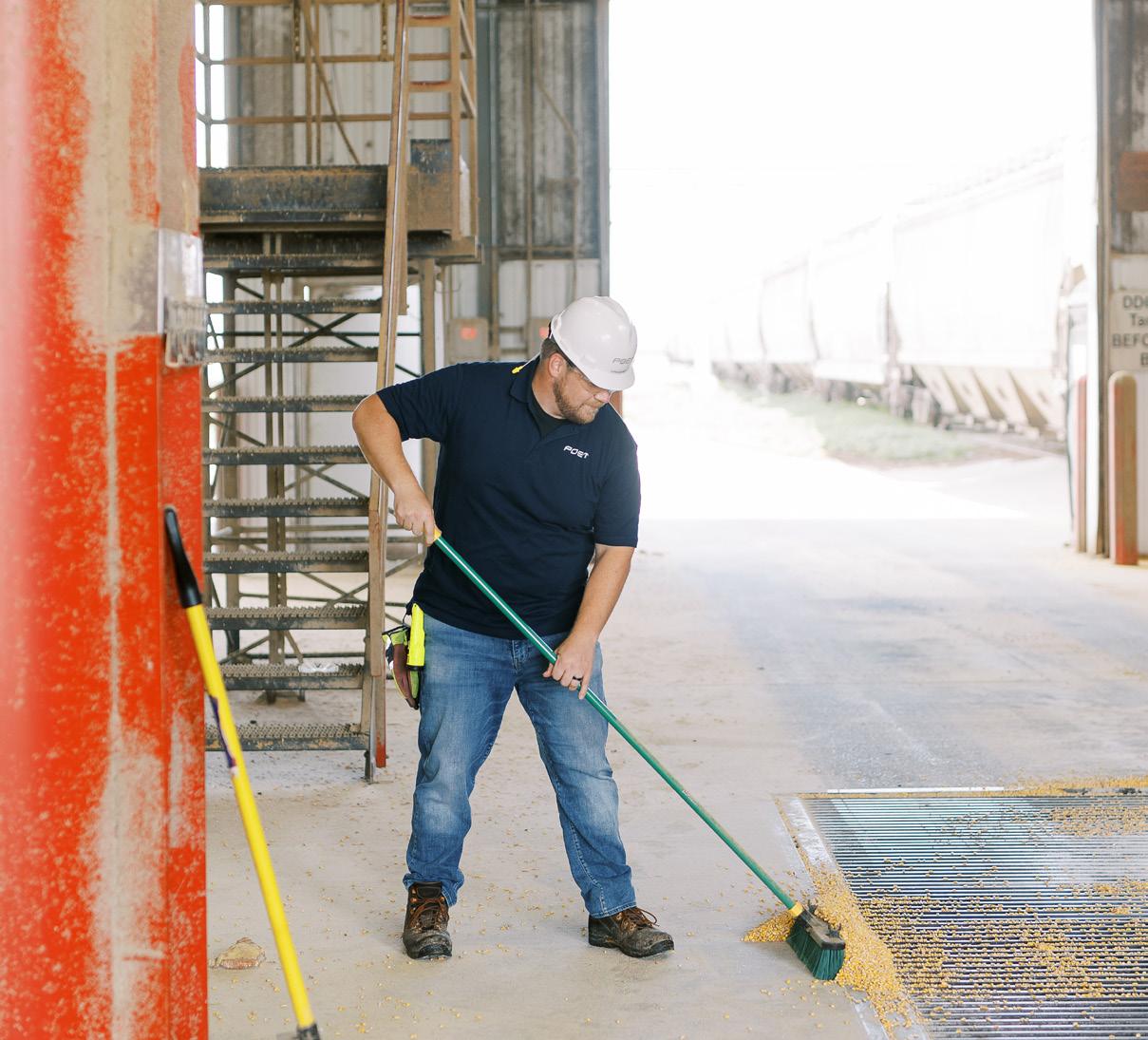

POET Bioprocessing – Shell Rock and POET Bioprocessing – Fairmont achieve FSSC 22000 certification
By Erin Smith, POET Media SpecialistOver the past three decades, POET has built a global reputation as a trusted feed source with its Dakota Gold and NexPro brands.

Now, they have taken that reputation to the “Nex” level: two of POET’s bioprocessing facilities have achieved the Global Food Safety Initiative (GFSI) Food Safety Management System Certification (FSSC 22000).
POET produces 6.4 million metric tons of distillers dried grains (DDGS) annually at its 33 bioprocessing facilities. DDGS are a nutrient-rich co-product of the bioethanol production process that are utilized as a high-quality, low-cost feed ingredient for livestock producers all over the world. They’re rich in the protein, minerals, and fiber that animals need.
This certification, which was achieved at POET’s bioprocessing facilities in Shell Rock, Iowa and Fairmont, Nebraska, gives customers in the pet food, aquaculture, and other feed markets even more assurance that POET’s high-protein feed products have been produced and handled according to the highest food safety standards.
“This is a terrific accomplishment and a very exciting opportunity for POET to enter new markets,” says Berit Foss, Regulatory Affairs & Quality Control Director for POET Bioproducts. “We always strive for safety on the highest level, and this certification is proof of that commitment. We’re proud of our team members for remaining diligent in their efforts to fulfill and maintain GFSI compliance.”
This certification also helps POET move one step closer to achieving its sustainability goals — including the UN Sustainable Development Goal of “Zero Hunger”— by providing clean, safe, and sustainable feed and food products.
“Our team has worked very hard over the past thirty-plus years to grow POET into a brand that is trusted all over the world for its suite of high-quality bioproducts,” says Greg Breukelman, President of POET Bioproducts. “We are committed to going above and beyond to serve our customers with consistency, safety, and service they can count on, and we will continue to offer only the very best as we venture into new markets.”


On Tuesday, November 8, millions of Americans will cast their ballots in the 2022 midterm elections. Control of the U.S. House and Senate, as well as 36 governorships and the balance of power in 46 state legislatures, are all up for grabs.
The television ads have started, and the fall campaign season is officially in full swing. So, let’s take a closer look at the political landscape, historical trends, and national dynamics that could shape the outcome of this year’s election.
By any measure, today, our nation is deeply divided along political fault lines. According to one poll, political polarization ranked third on a list of 20 issues most concerning voters. Recent Gallop data showed that Democrat (29%) and Republican (28%) party affiliation is virtually tied — with Independents (41%) leaning just slightly more Republican when casting their ballots. America’s political divide is perhaps most apparent in the U.S. Senate, where Democrats and Republicans each control 50 seats, with the tie-breaking vote going to Vice President Harris.
As writers at FiveThirtyEight noted at the beginning of this year, “One of the most ironclad rules in American politics is that the president’s party loses ground in midterm elections. Almost no president is immune.”
Recent polling seems to back up the electoral history books. Most state of the union polls at the beginning of September showed that a majority of Americans disapprove of President Biden’s job performance and believe — by even larger margins — that the country is headed down the wrong track. Political prognosticators staring into their crystal balls generally give Republicans a slight advantage to retake the House and at least a fighting chance to recapture a narrow majority in the Senate. However, Democrats are increasingly optimistic about their ability to outperform historical trends and preserve unified control of the White House and Capitol Hill. At the beginning of September, Democrats saw President Biden’s approval ratings gradually ticking upward — above the critical 40% mark — and their party was closing the gap with Republicans on the “generic ballot” — whether voters chose a Democrat or Republican in their Congressional district if the election were held today.
Which party and which candidates have the most momentum crossing the finish line remains to be seen. The winning margins in a handful of battleground races that decide Republican or Democratic majorities might simply be too close to call on election night.
“It’s the economy, stupid.” James Carville, advisor for former President Clinton, coined this now legendary catchphrase during the 1992 campaign. Recession and inflation were at the forefront of the national conversation at the time, much like they are today. Practically every poll shows that inflation is still the top issue on voters’ minds heading into the fall election.
Unease about the economy and kitchen table issues are usually bellwethers of political change. An ABC News/Washington Post poll showed “more than two-thirds (69%) of Americans think the nation’s economy is getting worse -- the highest that measure has reached since 2008.”
Inflation and the economy certainly deserve top billing, but ongoing debates around fuel prices, climate, energy independence, and the future of transportation could also play meaningful roles in the next election. Fortunately, biofuels present politically-agreeable solutions for voters on both sides of the aisle, as well as those in the middle.
According to recent research, Democrats tend to place the most emphasis on the environmental benefits of bioethanol, including immediately reducing greenhouse gas and tailpipe emissions in the existing transportation fleet. Republicans tend to focus on securing America’s energy independence with homegrown biofuels while creating jobs and economic opportunities. With gas prices still stinging Americans’ wallets, both sides agree that bioethanol is the best source of savings at the pump.
In a day and age when America is so divided on seemingly so many issues, it’s nice to know that biofuels still earn steadfast support from candidates across the political spectrum.
One vote can indeed make a difference. This year, we witnessed more than one major legislative battle decided by a single vote. As the world’s largest producer of biofuels, POET’s team is continually working to cultivate, maintain, and grow a strong coalition of champions on Capitol Hill and across the states — regardless of their party affiliation. Whether we like it or not, biofuel policy can get political, but that’s why it’s so important to continue to make your voice heard in the 2002 midterm election and beyond.

This past summer, fuel in America sustained high price points for a long enough time that motorists did everything they could to save money. Although prices have leveled off slightly, the most obvious option to continue saving money at the pump is to choose the fuel with the lowest price: bioethanol, which saved consumers in our area as much as fifty cents per gallon over nonethanol fuel in the midst of the long-term price spike.
Since then, we've continued to see an uptick in bioethanol use by our own customers, who have been calling us to ask what bioethanol blends they can use in their vehicles.
We are more than happy to educate them that E15 is certified for use in all 2001 and newer vehicles. When asked about higher blends like E30, we inform them that we use higher blends in all our cars requiring premium fuel — and a lot of times use it in the ones that don’t as well. In addition to saving money, we’ve seen performance gains thanks to the higher octane. And while we can’t tell our customers they should use E30 in a non-Flex Fuel car from an EPA certification standpoint, many of them are reporting mileage gains when they do.

With the increased use of biofuel, we have yet to see any problems that relate directly to bioethanol. We have had three customers who filled their non-Flex Fuel tanks with E85. While they did have the “check engine” light come on, only one of them experienced slightly decreased performance. We told them all to drive the car until the tank was about three-quarters empty, then fill it with non-bioethanol gasoline. In each case, the light went off, and the engine ran perfectly. No damage was done to any vehicle.
These results have been the same throughout the history of our shop. We have not seen any damage caused by using bioethanol. The same can be said for our auto recycling business, which takes in hundreds of vehicles yearly, with none coming to us due to bioethanol damage.
Bioethanol keeps the engines we service cleaner and helps them achieve peak performance when the optimum octane level required is met by using bioethanol.
One of our cars is a performance Chevy Camaro. It runs well with 91-octane gasoline but runs even better with E30 due to the higher octane. This allows the computer to do its job and optimize spark and fuel. This car will achieve 23 MPG with E30 as opposed to 21 MPG with non-bioethanol fuel — in addition to the bonus of huge cost savings. It has driven on E30 for over 50k miles with absolutely no issues.
You heard it here, from experienced mechanics who have used the fuel ourselves for many years: clean, American-made bioethanol helps cars run their best and saves you money. If you haven’t made the switch yet, what are you waiting for?
The Motor Medics. Under The Hood can be found on a station near you or your favorite podcast site.





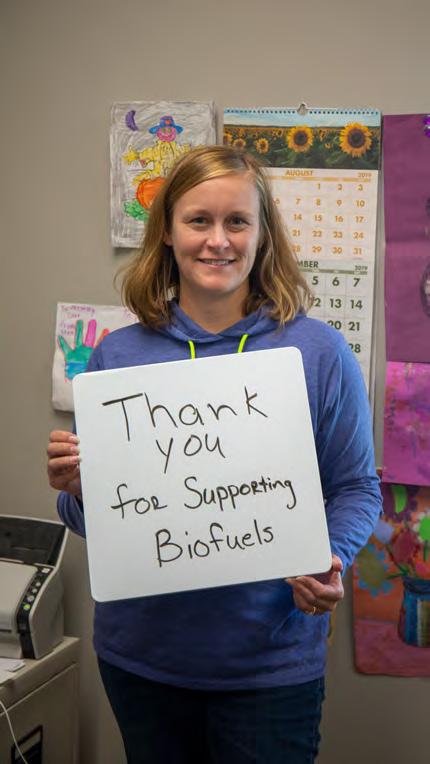



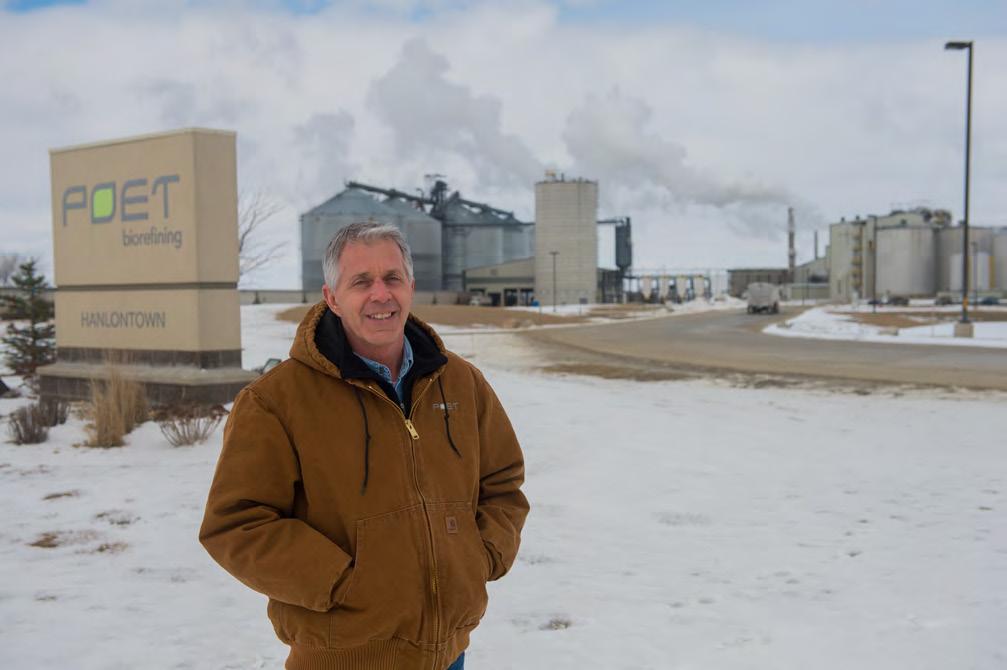

 By Matt Merritt
By Matt Merritt
It makes sense that an industry working for American energy independence and security would place a high value on military service. But even understanding that, the facts for the biofuels industry are impressive.
Veterans make up 16% of the bioethanol workforce, according to the U.S. Department of Energy. That’s more than any sector in the entire energy industry, and it far surpasses the six percent national average. POET proudly employs 101 team members who are military veterans.
The biofuels industry benefits from the work ethic, leadership, experience and values of veterans nationwide. At the same time, many of those veterans see a sense of purpose and patriotism in what they do to grow our nation’s use of clean, American-made biofuel.
Morgan Skluzacek, Merchandising Coordinator at POET Bioproducts in Sioux Falls, has served in the Air National Guard for the past six years. She is not surprised by the number of veterans in the biofuels industry. People in the Midwest have that “American, homegrown” spirit, she says, that makes them value things like agriculture and the environment.
“I think that kind of goes hand-in-hand with the military because we are fighting for our country; we're there to do anything we can for our homeland and for those who might need help,” she says.




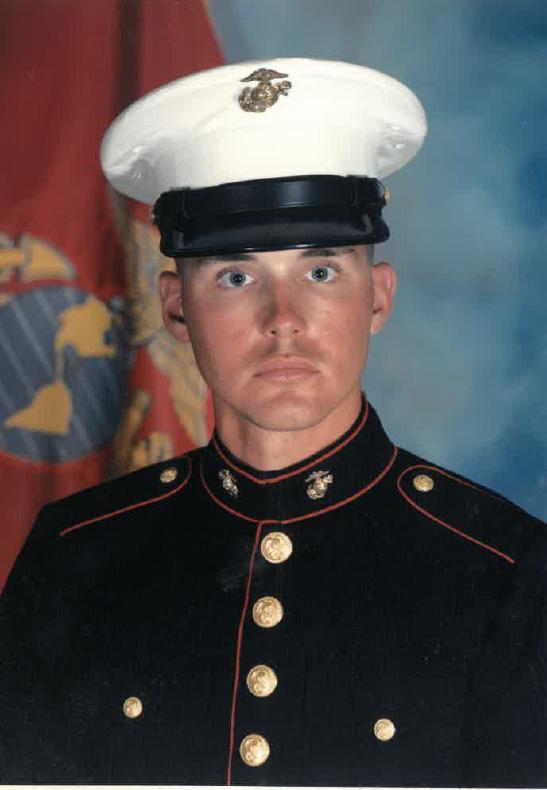
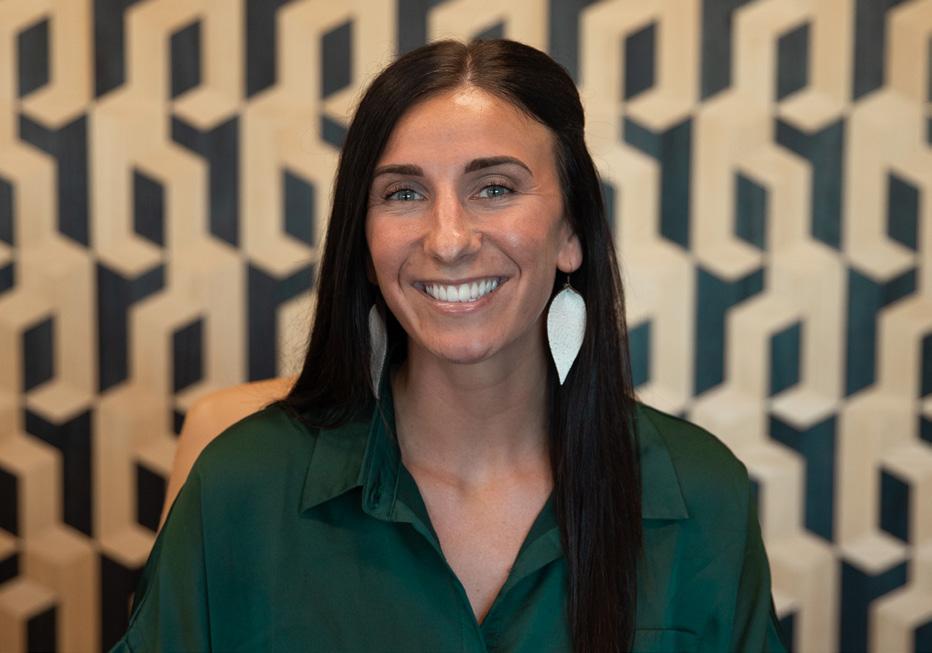
Bioethanol displaces more than 700 million barrels of oil per year, and every gallon displaced makes our nation more resilient in dealing with disruptions in the global oil market and conflicts overseas.
President Biden highlighted the important role biofuels play in countering the bad actions of foreign nations when he announced that E15 would be available throughout the summer 2022 driving season.
“The President believes that the actions of a dictator half a world away should not impact what families pay at the pump here at home,” the White House stated in an outline of the President’s announcement.
Many of the veterans at POET say military service is about a purpose, a spirit of helping the world. That same spirit drives them in the biofuels industry.
“You do it because there's a higher calling to make the world a better place. You leave it better than you found it, which is what we're all about here at POET,” says Michael Skoudas, Vice President, Sales and Marketing at POET Bioproducts. Skoudas served in the U.S. Marine Corps from 1986 to 1990.
Todd Springer, Maintenance Manager at POET Bioprocessing – North Manchester, is also a Marine Corps veteran who served from 1988 to 1991. He, too, sees similarities in purpose between his current industry and the military.
“At POET, I see the drive, the focus on making things better,” he says. “In the military, you're going into an area to make things better...And I see the same thing that we're trying to do here. We're making things better for the world.”
Many veterans at POET talk about the skills they developed in the military that eventually turned into careers in the private sector.
Kenneth Yaeger, Maintenance Technician at POET Bioprocessing – Laddonia, served in the U.S. Navy from 1977 to 1999. He learned to operate boilers on aircraft carriers, destroyers, and more.
“This is what I've done since I was 18 years old. I've been in maintenance,” he says. “Here in Laddonia, I run the boilers and take care of the water, chemistry, and stuff here. It's what I've done my whole life.”
Taking care of equipment is a key part of training and service, says Nathan Thompson, Inventory Specialist at POET Bioprocessing – Glenville and member of the U.S. Army National Guard from 2004 to 2014.
“If you got equipment that's yours, you're a maintenance guy for that piece of equipment,” he says. “Whether it's a Humvee, a tank, or a plane, you're maintaining that thing, and there's a lot of skill level with that. For us at the plants, that's a great skill to have. The more technical, the better.”
Personal skills are also an important part of military service, and those skills have been a key to career success for POET team members.
Springer, at North Manchester, says the hierarchy in the military created opportunities to observe different leadership styles — both positive and negative — and employ those skills.
Top: Todd Springer, Maintenance Manager at POET Bioprocessing – North Manchester Marine Corp. 1988-1991
Middle: Morgan Skluzacek, Merchandising Coordinator, POET Bioproducts, Air National Guard, 2016-2022
Bottom: Michael Skoudas, Vice President, Sales and Marketing at POET Bioproducts, Marine Corp. 1986-1990
“You have the people that you'd follow to the end of the Earth just because of the person that they are,” he says. “And that's what I gravitated to.”
“You're serving your troops, which is exactly what the POET leadership characteristics are about: leading with the servant's heart,” Skoudas at POET Bioproducts says. “That's exactly what the military's about. You're serving your country. You're serving your fellow Marines. They come first. That's what you do.”
The military places a priority on critical thinking and fast action in high-stress situations. That experience comes in handy, whatever work or life challenges are thrown their way.
“You can have the best-laid plans, but the minute the first round goes downrange, the plan changes, and you have to adapt and be flexible and figure things out,” Skoudas says. “That skill and the ability to deal with those things has always served me very well in life and at POET.”
The military is more than a job. It’s a lifestyle. It’s a purpose. It’s a family. Those things stick with a person.
“Some of my closest friends are in the military,” Skluzacek at POET Bioproducts says. “It's just like a big family. Just always having those people in your corner is a really good thing, and the trust is always there.”
With 22 years in the U.S. Navy, Yaeger at Laddonia has already given a large part of his life to serving his country. He’s ready to answer the call today.
“I'm almost 64 years old,” he says. “If I had to go back today and do it again, I'd go. If I ever got called, I’d go back."
Right: Photo of military vessels provided by Michael Skoudas
Adam Chedester
Adam Chrans
AJ Poeppe
Benjamin Warwick
Bill Dixson
Bob Byers
Brandon Fischer Brandon McLellan Brian Shields
Brian Torgerson
Brock Hambrock Charles Hauxwell
Chris Hanson
Corey Edwards
Damon Klumb

Darren Thompson Dennis Gnewuch
Derek Witt
Doug Stevenson Douglas Janssen Eric Smith Hayden Hughes
James Bowers
James Eliason
James Randa
Jason Mitchell
Jeffery Sherrill
Jess Wickre
Jim Beezley
Jim Calvin Jim Hill Joe Mahaney
John Mikulski Jon Perkins
Jon Podzimek
Joseph Scholte
Josh Berry
Josh Hedden
Justin Strawn
Kenneth Yaeger
Kirtley Hershey Luke Fitcher
Matt Mcconnell
Melvin Tiffany Michael Sidle
Michael Skuodas
Michael Starlin Mike Smith
Morgan Skluzacek
Nate Tafolla
Nathaniel Thompson Neil Anderson Nick Titze
Rex Henning Richard Albertson Rick Green
Robert Braun
Robert Wood Ron Bovee
Ryan Campbell
Samuel Fager Scott Hall Scott LeBrun Scott Sawtelle Steve Smith
Terry Freier
Tim Schlotterback Timothy Jordan Todd Springer Tom Therkelsen
Thank you to the POET team members who have served in the U.S. Military!
In NASCAR, there is no doubt that winning races defines a team on the racetrack. For NASCAR’s partners, however, success depends on how wide and deep we cast our nets.
With almost 70 million fans, NASCAR trails only the NFL in followed sports. And with bioethanol surpassing 20 million miles as the official fuel of the sport this year, we continue to evolve in our net casting. It should be noted that those 20 million miles were driven in what are considered the most brutal fuel testing conditions conceivable.
We first cast our net in 2011 when we became a founding partner of NASCAR Green and a member of the Richard Childress Racing (RCR) team. That year, we also introduced the American Ethanol brand.
Growing that brand was a hands-on effort at nearly every track raced and took many boots on the ground to accomplish. E15 (or Unleaded 88) was still very much in the early adoption phase at the retail level, so the lift was heavy. But we proved our value to NASCAR and to America by lowering tailpipe emissions by 20% while increasing octane and helping engines run optimally.
In recent years, as we have evolved into the Get Bioethanol brand, our net has also evolved. We’ve utilized digital media more and more. We’ve cast nets for the obtainable consumer — the one who wants to make a change.
This plays right into NASCAR’s evolution.
With car, track, and race structure changes, NASCAR is tailoring to a younger audience. The sport has invested heavily in its digital platforms. This audience is climate-conscious, and our message to them is clear and concise: Bioethanol is a greener, ready-to-fuel solution.
We have also widened the net with the help of our influencer on the track. RCR’s famed #3 has a rich history and a great platform to tell our story — a platform that has continued to gain momentum. Austin Dillon is now one of the most popular drivers in the Cup Series, and his recent win at Daytona punched his ticket to the playoffs. His skill and popularity earned him his own television show.
Austin’s Life in the Fast Lane debuted in June of this year. It highlights the lives of Austin Dillon and his rear tire changer and best friend, Paul Swan, whose wives also became best friends when they were cheerleaders for the Tennessee Titans. The natural chemistry of the group sets up a story that tells itself.
The show has great range, with scenes that take place everywhere from the RCR race shop in Welcome, N.C., to Beverly Hills. If you’re anything like me, you probably don’t consider yourself a reality TV fan. Still, the behind-the-scenes perspective of NASCAR will reel you in. Life in the Fast Lane is casting the Get Bioethanol net to an even broader demographic. The brand was even front and center during the second episode of the series, and there will be more opportunities to get in front of audiences in future seasons.
What began as a simple partnership with NASCAR has evolved into a wide range of avenues to showcase our product both on and off the track, and we will continue to cast that net as wide as we can to reel in even more biofuel believers.
Austin’s Life in the Fast Lane debuted in June of this year. It highlights the lives of Austin Dillon and his rear tire changer and best friend, Paul Swan.



I recently had the chance to take a short trip aboard a semi-truck. Outwardly, there was nothing especially futuristic about it; look under the hood, however, and you may just be catching a glimpse of the next generation of trucking.
Thanks to modifications by the team at ClearFlame Engine Technologies, this is no ordinary engine. It can run exclusively on pure bioethanol, including cleaner-burning E98, while retaining all the performance characteristics of diesel engines and offering significant savings on transport costs.
It’s a testament to the remarkable potential of renewable fuels and the crops that make them. As the proud Governor of the top corn- and ethanol-producing state in the nation, I love seeing all the innovative ways companies are getting the most out of our products.

That’s what I appreciate about POET, a world-class company that's no stranger to finding exciting value-added uses for corn. Every day, POET helps demonstrate that biofuels are moving into the future faster than ever. I’m convinced that the industry’s continued vitality will remain critical to Iowa’s prosperity for years to come.
After all, biofuels account for more than $5 billion of our state’s GDP and support tens of thousands of jobs. Over a quarter of America’s bioethanol comes from Iowa corn. Our biofuel production powers our economy and fuels the world.
This position of global leadership means that what we do here reverberates far beyond our borders. When Iowa speaks about biofuels, people listen. And we’ve never spoken more loudly, or more clearly, than we did this year.
After years of work and negotiation, Iowa became the first state in the nation to adopt an E15 standard, setting the stage for the single-largest expansion of biofuels in Iowa’s history.
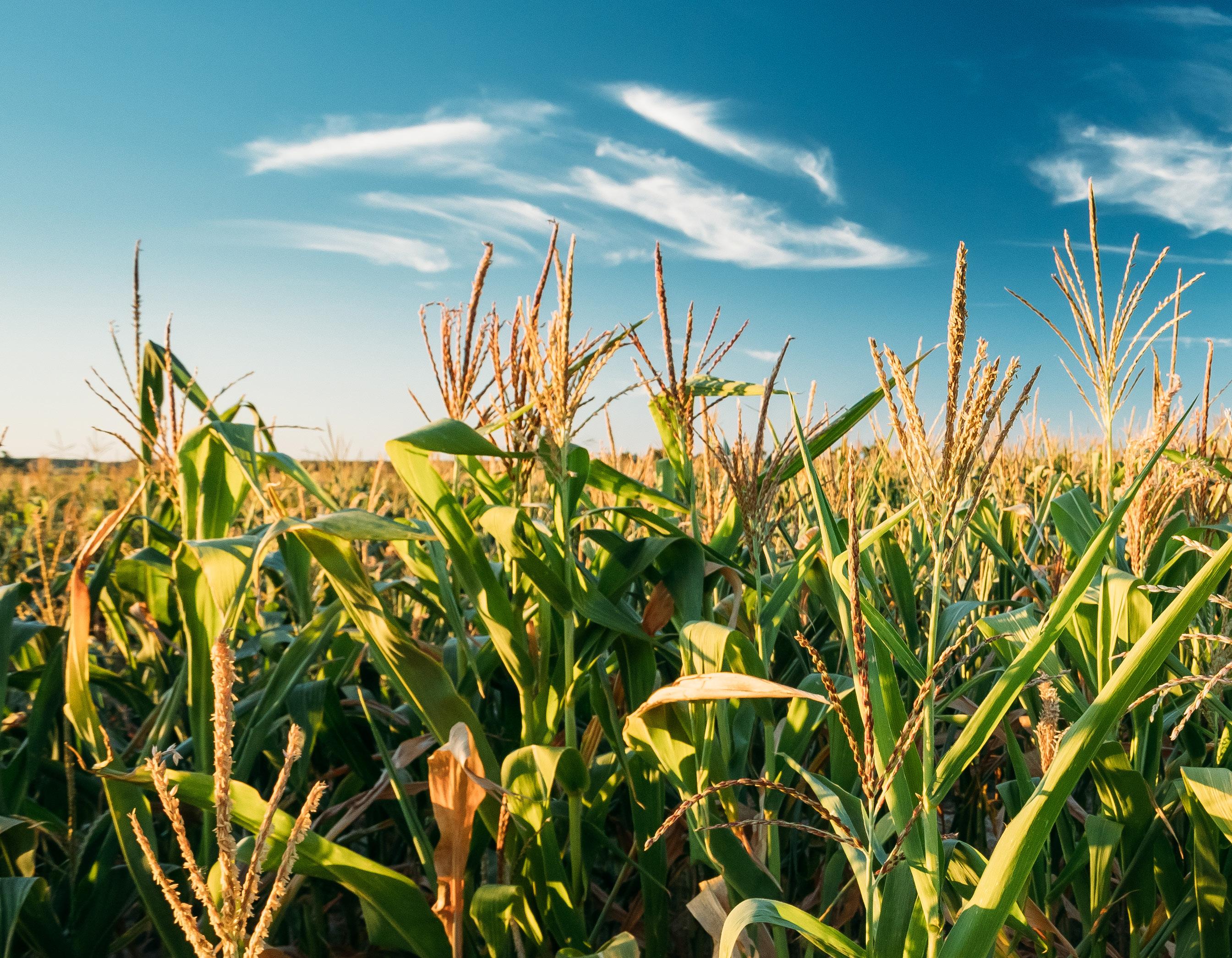
I proposed the first version of this bill two years ago, and the quality of the final product shows that good faith negotiation and compromise can pay off in a big way.
It expands fuel retailer tax credits, ensures our fuel infrastructure will be ready for higher blends and comes with a $10 million investment in Iowa’s Renewable Fuel Infrastructure Program. Above all, it allows Iowa to take charge of our own renewable fuel economy.
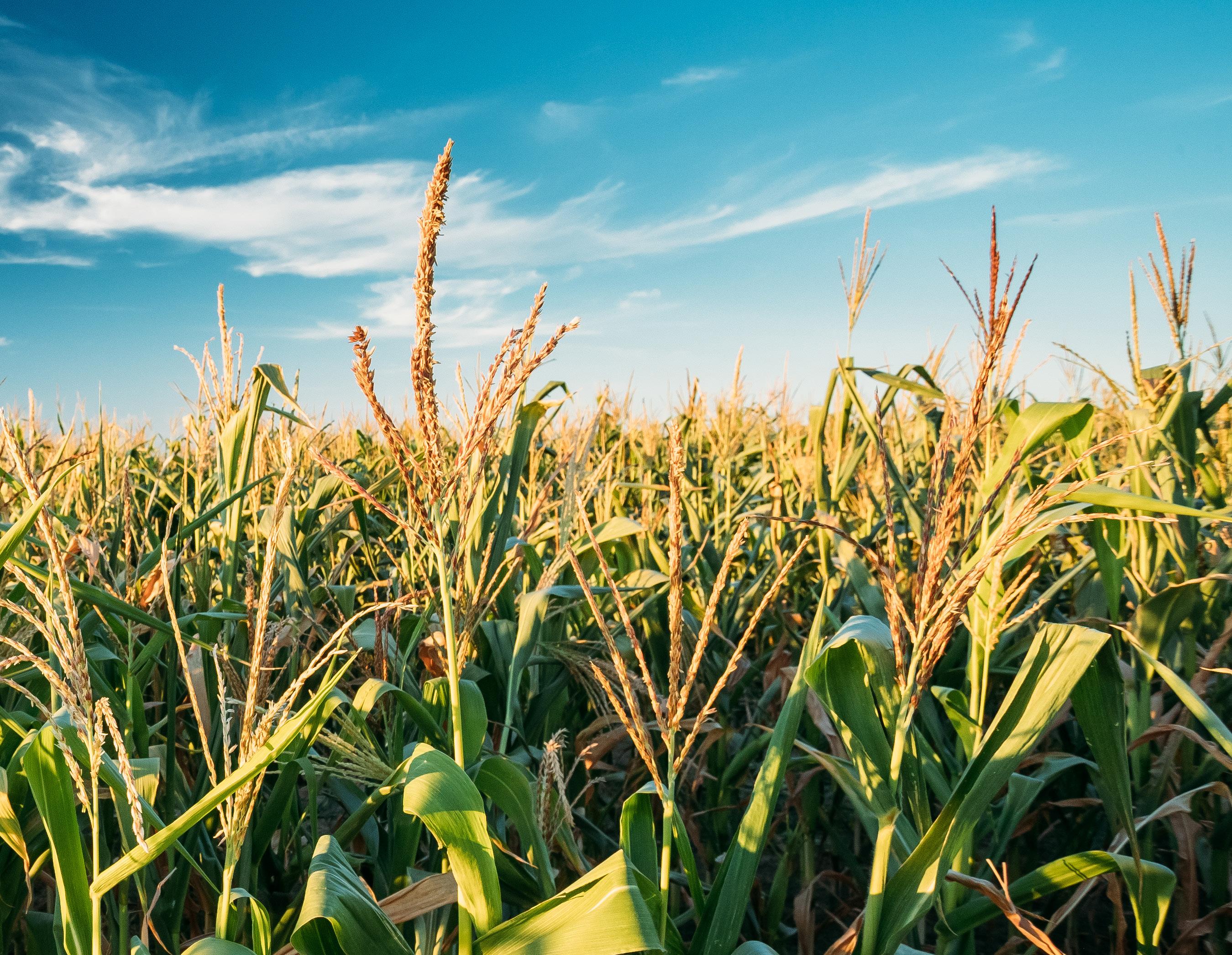
It's a victory that couldn’t have come at a better time for Iowans, who continue to struggle with record inflation and high gas prices. Like so many Americans, Iowans are desperate for relief; this law will deliver it.
Our leaders at the national level should learn from this example. The fallout from Russia’s invasion of Ukraine has revealed how foolish it is to bank on the willingness of brutal dictators to grace us with more oil and gas.
It’s also no solution to encourage Americans who can’t afford gas to buy an electric vehicle, nor are unrealistic schemes to eliminate gas-powered cars, especially as China works to lock up the electric vehicle battery supply chain.
The true answer is to take meaningful action in partnership with American industry — not that of our adversaries. We’re doing it in Iowa, but it’s not too late for Washington to follow suit.
Earlier this year, I led a bipartisan group of eight Midwestern governors to formally request that the EPA allow our states to sell E15 year-round without restriction on a permanent basis. The temporary waiver for this year was a welcome first step, but now it’s time to finish the job.
While I'm optimistic about the prospects of the permanent waiver, here’s something I can guarantee with certainty: I’ll never stop fighting for this industry, nor lose sight of the message we sent this year when we passed the biofuels bill: that America’s energy is already growing right here in Iowa’s fields.


In his senior year of high school in Shickley, Clark Schultz watched the bioethanol plant rise up from the corn fields in the neighboring town of Fairmont in southeastern Nebraska. Nearly a decade later, after earning a college degree in biochemistry and working in pharmaceuticals, he returned to his home territory to begin work as a bioethanol lab tech at the bioprocessing facility. With his background in the manufacturing of painkillers at one job and making controls for hematology and urinalysis equipment at the other, he was familiar with strict laboratory protocols and regulatory compliance.
That was 2016, when the plant was still part of Flint Hills Resources and the Food Safety Modernization Act (FSMA) was new — introducing hazard analysis, safety planning and new record keeping requirements for all manufacturers of animal feed ingredients. Within a year, Schultz was promoted from a tech working in the lab to quality manager.
“Quality managers were responsible for the implementation of FSMA, and when I went to that training, it clicked,” Schultz says, thanks to his previous experience. “When I got back to the plant, I said we need to implement this and this. I actively got involved with teams that were implementing the program. I immersed myself in the law under FSMA, read it, and explained it to people. I jumped right in out of my own personal interest. I also saw the importance of protecting our customers and also in protecting the company, its name, and the brand.”
At the same time FSMA was being implemented, Schultz adds, the facility was installing and fine tuning a system to make a new high-protein feed ingredient trademarked NexPro. “I helped build out the systems, determined sampling points, set up equipment, wrote procedures, and worked with commercial partners to develop the quality specifications that would mean something to our customers.”
David Gerhart, Plant Manager at POET Bioprocessing – Fairmont, says that Schultz’s dedication to his role did not go unnoticed by the team.
“Clark started as a shift technician and worked his way to the lab manager,” says Gerhart. “Now he is in a fleet role. He is always striving for continuous improvement, which is an incredibly valuable characteristic.”
After the transition to POET ownership of the Fairmont facility last year, Schultz became part of the team working on the next step in quality assurance. Fairmont was among the first bioethanol facilities to achieve the Food Safety System Certification, an internationally recognized food safety program with comprehensive requirements.
“It consumed a large majority of our time in the past year to get that certification, says Schultz. The certification allows POET Bioprocessing – Fairmont, and its sister facility POET Bioprocessing – Shell Rock, to expand their NexPro feed into new markets with significantly higher quality requirements than those for traditional distillers grains.

Food safety, Schultz admits, has become his passion, one that he’s applying to a new role at POET Bioproducts as a Regulatory Affairs and Quality Control Specialist. He looks forward to continuing to encourage the necessary mindset — from considering grains coming out the back end of the bioprocessing facility as byproducts in the early years, to coproducts, and now food and feed ingredients. “We’re really trying to shift the mindset into a food safety focus,” he explains. “It’s getting people to think about the product and how it could ultimately affect an animal or human.”
“In my new role, I’m looking forward to building out our food safety program and going site to site and helping with training people.”
According to Gerhart, Schultz never misses an opportunity to help out his team. “Clark is always willing to pitch in and help wherever needed, whether it’s on the job or in the community. Whether it’s planting trees for Earth Day or working at the county fairs, he is a team player and shows great respect for whatever task he is performing.”

Schultz will continue to be based out of Fairmont in his new role, which is ideal considering he and his wife, Theresa, built a new house on 13 acres in the country. “We moved into our house three years ago, and a week later had our daughter, Evelyn,” adding they had twins, Edison and Olive, a year ago. “We like to stay busy,” he laughs. This spring, Schultz planted fruit trees and berry bushes on the property, with a garden on the drawing board. He also tends goats, ducks, and chickens on the hobby farm.
Schultz appreciates POET’s interest in community involvement. “On Earth Day, I went to my daughter’s daycare in the school where I went to high school, and we gave dirt cups to the threeyear-olds and planted soybeans in these little greenhouses. Having the time and opportunity to do things like that in the community is fun and rewarding. POET even has a grant program where we gave some grant money to my hometown to help build a park playground. Seeing the company I work for do that in the community where I grew up means a lot to me.”




On a Saturday morning in May, a single semi-truck pulled out of the ClearFlame Engine Technologies tech center in Illinois and drove 250 miles to its test facility in Indiana.
This was not your typical semi-run. Because that semi-truck, through breakthrough technology that requires only slight modifications to its Cummins heavy-duty diesel engine, is powered by bioethanol.
Those 250 miles, that first long-haul trip, may be the next step toward eliminating the pollutantheavy diesel fuel from the trucking industry. Those 250 miles may also be the next step toward greatly reducing the nearly five gigatons — that's five billion metric tons — of CO2 emitted by diesel engines annually.
ClearFlame's patented process can be performed by any diesel mechanic, and roughly 80 to 90% of the engine parts remain stock. It's a technology that could be seamlessly implemented into any diesel fleet.
Tests have shown that the engine still produces the same high torque, energy efficiency, and durability as a diesel. But it produces 40 percent fewer greenhouse gases and saves, at current fuel rates, more than $3 per gallon (and nearly 35 cents per mile). Instead of spewing diesel soot out of the tailpipe, the exhaust looks almost clear.
"This is the kind of technical innovation that can change the trucking industry," says John Carlisle, Senior Advisor at Argonne National Labs. "This company has gone from two people looking at what some would see as a science fiction project to actually running a semi-tractor, with a modified version of its original diesel engine, on pure bioethanol."

Today, ClearFlame Engine Technologies employs 30 people and partners with big names like John Deere, the U.S. Department of Energy, and the Bill Gates-founded Breakthrough Energy Ventures.
"They've got Tesla and other giant, billion-dollar entities that are chasing the same overarching goal," says Carlisle, a science entrepreneur and physicist. "ClearFlame has a faster, quicker way to achieving decarbonization in heavy transportation, in my opinion, than Tesla does."
ClearFlame started in a Stanford University laboratory in 2015 when lab mates Julie Blumreiter and BJ Johnson partnered together in what Johnson describes as "a standard academic pursuit of how to make engines cleaner and more efficient."

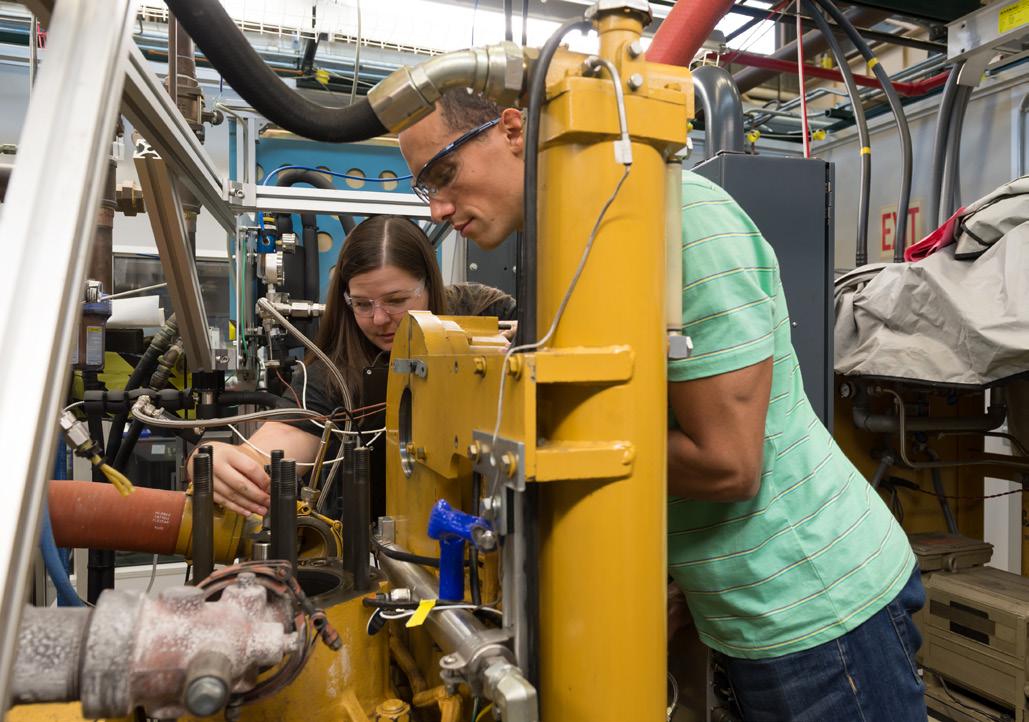
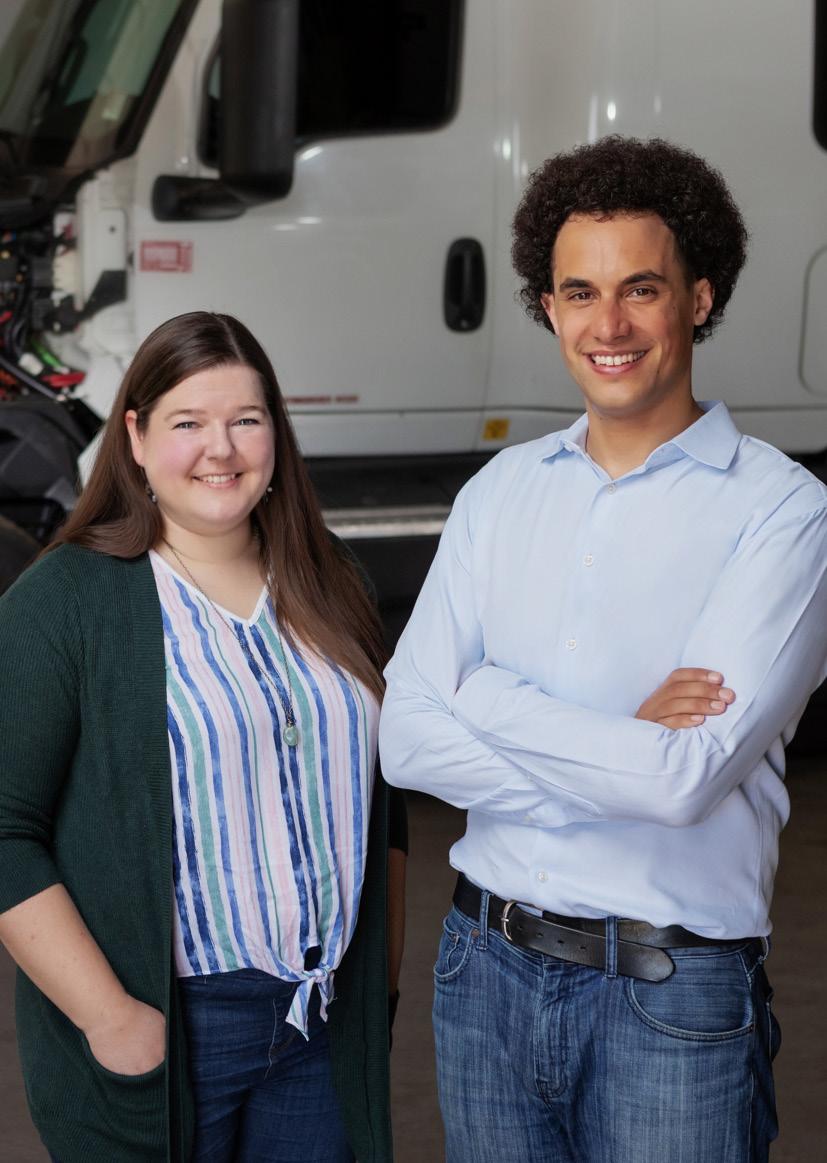
During that "standard academic pursuit," they tested Johnson's idea of taking an existing engine, like a diesel, and converting it to run on alternate, more environmentallyfriendly fuels, like bioethanol.
"I remember one early test when we realized how much cleaner the emissions would be running bioethanol instead of diesel," says Blumreiter, a mechanical engineer who says she swore she'd never be part of a start-up.
"We knew right then we could scale this in a way that could improve air quality and fight climate change."
Julie Blumreiter, Co-Founder and Chief Technical Officer of ClearFlame Engine Technologies
Blumreiter and Johnson spent much of the next year in the lab at Stanford and in discussions about the future of ClearFlame.
In 2017, Blumreiter and Johnson — along with 120 other startup companies — applied for the first-ever Chain Reaction Innovations program, a two-year fellowship focused on clean energy and science technologies. The program is based at the Argonne National Laboratory, the Chicago-area science and engineering research facility run by the University of Chicago and funded by the U.S. Department of Energy.
ClearFlame was one of just five companies chosen for the program.
"The chance to partner with Argonne was an amazing opportunity," says Johnson, who grew up in Seattle. "I don't come from an agriculture background, so I'm not pushing bioethanol for that reason. I'm talking about engines, but I don't have Detroit in my blood. I believe in this technology because it solves a real problem, and it can make the world a better place."
Blumreiter and Johnson moved to the
Chicago area for the Argonne opportunity.
"Once we got to Argonne, once we got that proper office space and lab space and the money and opportunity to do more testing, ClearFlame became all-consuming for us," says Blumreiter, who, due to her love of the engineering side, has taken on the official role of Chief Technology Officer.
Even the scientists at Argonne, though, were skeptical of technology that could transform a heavy-duty diesel engine to run on bioethanol without fundamentally changing the engine.
"The program is special in that if you are selected, you get the power of a national lab behind you," says Carlisle. "The paradox here is that the scientists at the lab couldn't believe the ClearFlame technology could work."
At their R&D station at Argonne, Blumreiter and Johnson were given the use of a heavyduty, single-cylinder test engine. The same engine, it turns out, that Julie's great uncle, Werner, had designed during his long tenure working for Caterpillar.
"It felt like a sign," says Blumreiter. She and Johnson, though, immediately sensed the skepticism. "We knew we had to prove our technology once again."
They did.
"When we got that single-cylinder engine up and running on bioethanol and were able to show our data to the scientists there, they had this show-me moment where they finally says 'OK. This is possible.'"
By 2020, ClearFlame was testing — and proving — their diesel-to-bioethanol technology on multi-cylinder engines. The investment capital followed.
From the beginning stages of the project in 2017-2018 to 2020, ClearFlame received grants from the Iowa, Minnesota, Kansas, and Illinois Corn Growers Associations, the
Top: Dr. Julie Blumreiter and Dr. BJ Johnson
Bottom Right: Drs. Blumreiter and Johnson work on ClearFlame design
In 2021, Breakthrough Energy Ventures — along with Mercuria, John Deere, and Clean Energy Ventures — invested $17 million.
Later that year, a study by Gladstein, Neandross & Associates confirmed ClearFlame's projections that trucks running their engine technology would substantially lower the total cost of ownership, lower their cost per mile, and lower their greenhouse gas (GHG) output.
From an environmental standpoint, Blumreiter and Johnson knew that many of the major trucking companies were actively trying to reduce their GHGs and lower their carbon footprint.
"We meet with many big trucking companies, and one of the first things they ask is about things like carbon intensity," says Johnson.
"They want to do the right thing for the environment, and ClearFlame's environmental benefits sell themselves."
BJ Johnson, Co-Founder and CEO of ClearFlame Engine Technologies
From a financial standpoint, the study also showed something that every trucking company fights for every step of the way: bottom-line savings. The projected investment in converting a fleet to ClearFlame technology, says Johnson, can be recouped within 12 months through savings in fuel alone.
"This study validates what we’ve been saying for some time," says Johnson. "ClearFlame’s engine modification technology not only takes the dirty diesel out of diesel engines, but it is also less expensive in total cost of ownership than diesel, electric, natural gas, and hydrogen."
ClearFlame, meanwhile, has continued to grow. The engine technology has continued to advance. And Blumreiter and Johnson have never lost sight of what they had envisioned in that Stanford lab eight years earlier.
"We always knew we wanted to create something that could have a real impact on the environment," says Johnson. "I think the world is pretty close to having an 'a-ha moment' on ClearFlame right now. We're at a moment when diesel is well over $5. As a country, we're far behind on our environmental goals. Businesses are realizing the importance of the need for energy independence and cleaner alternatives to fossil fuels."
And, he says, that first fleet of trucks — with engines converted by the trucking company's regular diesel mechanics to run on bioethanol — could very well be in the works soon.
"There are those times when science fiction can be turned into science reality," says Carlisle. "Julie and BJ have done that. Their story is inspirational when you think about it. They set out to make the world a better place for all of us, and they may very well accomplish that."
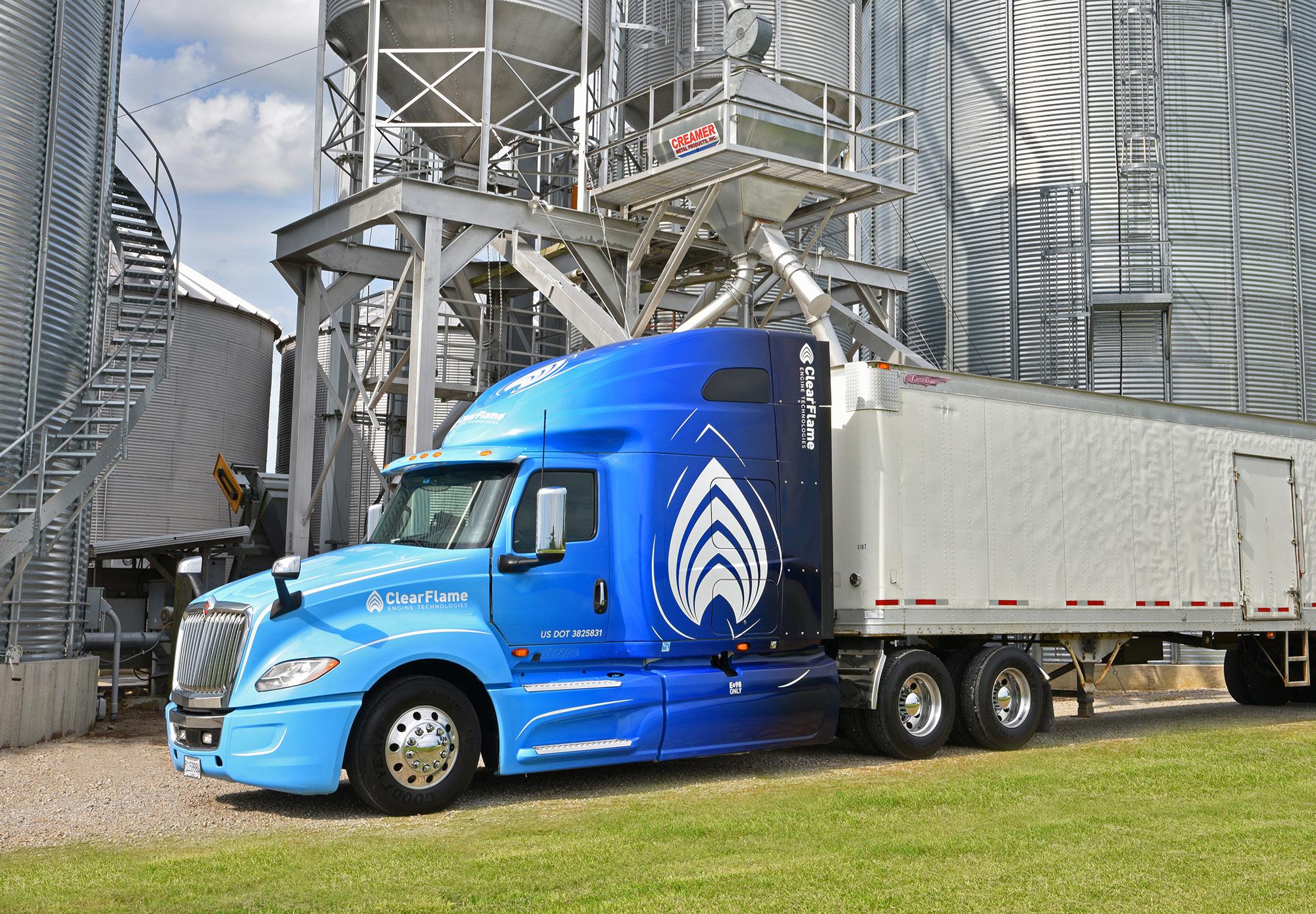


Did you know that George Washington, Thomas Jefferson, John Adams, James Madison, and James Monroe were all farmers? It’s thanks in large part to these men that our country has not only survived but thrived in its almost 250-year existence. Applying many of the same common-sense principles it takes to do well on the farm has helped grow and sustain the United States since 1776.
George Washington turned down the chance to be king and went back to the farm after serving two terms as president. He experimented with crop rotation and many novel farming practices.
Thomas Jefferson invented the moldboard plow and a machine to make pasta.
Ben Franklin once said, “There seem to be but three ways for a nation to acquire wealth. The first is by war, as the Romans did, in plundering their conquered neighbors. This is robbery. The second by commerce, which is generally cheating. The third by agriculture, the only honest way, wherein man receives a real increase of the seed thrown into the ground, in a kind of continual miracle, wrought by the hand of God in his favor, as a reward for his innocent life and his virtuous industry.”
Our Founding Fathers didn’t just have respect for farmers; they knew that agriculture was the backbone of our economy and crucial to the success of our nation.
I recently took a trip to Philadelphia and toured Independence Hall. When you’re in the room where liberty was declared, where George Washington sat during the Continental Congress, it makes you think about how fortunate we were to have such great leaders. One of the many things I thought about during that trip was what our forefathers would say about agriculture in the U.S. today.
I think they would be exceptionally proud. Our food supply today is the safest, healthiest, and most abundant we’ve ever had. Compared to other countries, we also have the least expensive food supply based on the percentage of our income we spend on food, despite the recent inflationary pressures.
Farmers are the original innovators, and I think many of the great American farmers from 250 years ago would be happy to see how the farmers of today are able to manage their land foot by foot across the field with such speed and accuracy, changing the rates of seed and fertilizer in a prescription fashion in order to maximize productivity in the best soils while conserving resources in other areas.
Farmers have also now reversed the centuries-long depletion of soil organic matter that dates back to when Washington and Jefferson were farming. Thanks to crop protection products, drain tile, GPS, and amazing equipment, farmers are now able to no-till or strip-till in order to rebuild soils, sequester carbon, and improve food quality.
And this is only the beginning of modern agriculture’s potential.
This is a great time to be an American, and we have many Founding Farmers to thank. Their experiences, their commitment to agriculture, and the foundations of liberty and prosperity they laid will allow us to cultivate an even greater nation for generations to come.

Our processes and equipment contribute to thousands of products people use every day...from immune-boosting juices to the wine we drink in celebration. Even the condiments on our burgers, the cheese on our sandwiches and the vegetables that nourish us are processed with GEA equipment. Going beyond food, GEA solutions are put to use in power plants, on all types of boats and at water treatment plants.
What’s more, sustainability and environmental conservation are key in each and every process we develop. That’s why our commitment to provide the separating technology required to produce renewable biofuels and agricultural co-products is as strong as ever. To learn more about GEA’s centrifuges and separation equipment and the industries we serve, visit us online at gea.com.

POET’s Never Satisfied Scholarship program was founded in 2016 to recognize and reward students who share POET’s never-satisfied mentality, ingenuity, and drive to change the world. Never Satisfied Scholars display what it means to work hard and persevere by taking positive change into their own hands — and we couldn’t be prouder to support them in their endeavors.
There are no major or GPA requirements to receive the scholarship, and those selected truly exemplify what it means to be “Never Satisfied.” Somehow, the students seem to become more impressive and more intelligent each year, making the process of narrowing down the pool of thousands of applicants even more challenging. That’s why, this year, the program was expanded to include two additional scholarships. This change increased the total scholarship funding to $60,000, with 12 university students awarded $5,000 each to put toward their education.
We can’t wait to see what these bright young people will accomplish in the years ahead. Now, without further ado, let’s meet our Never Satisfied Class of 2022!
Hometown: Ormond Beach, FL
School: Brown University
Majors: Environmental Studies and Biology (Pre-Med)
Salma Eldeeb is a trailblazer. She has never shied away from an opportunity to help her community. At a young age, she noticed pollution in the Nile river and knew her community and their health relied on the river. She researched Egypt’s air and ocean pollution, as well as the environmental causes of frequent hospitalizations in her community. She helped start Egypt Goes Eco, an organization that helps reduce pollution in the Nile River. She is currently the Deputy Director of Zero Hour (a youth-led climate organization). She plans to attend medical school for psychiatry and find a career at the intersection of her passions for mental health and climate activism.
Hometown: Royalton, MN
School: North Dakota State University
Majors: Electrical Engineering and Computer Engineering
Simon Kroll is not one to be content with the status quo. While the COVID-19 pandemic forced much of the world online, he assisted in implementing a system on his farm that would provide better and faster Wi-Fi for his family and other local farms. He also designed a retrofit kit for his farm’s irrigation system. In college, his internships consisted of a startup called Field of View, where he worked with GPS data, and as a software engineering intern at NASA’s Goddard Space Flight Center. Kroll already has a lot of expertise and experience under his belt, and we look forward to watching him achieve his goal of developing technology to help farmers lower their carbon score while optimizing their yields.




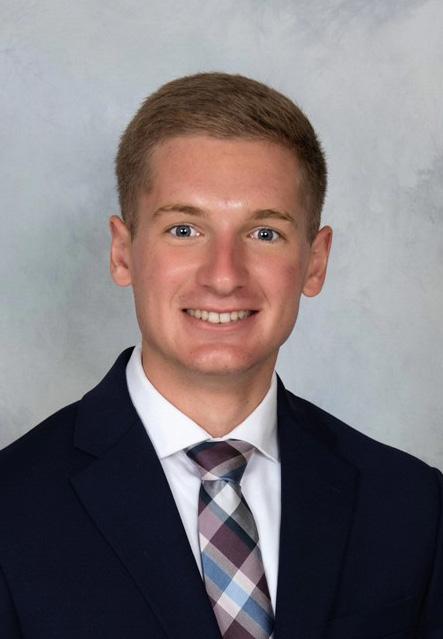

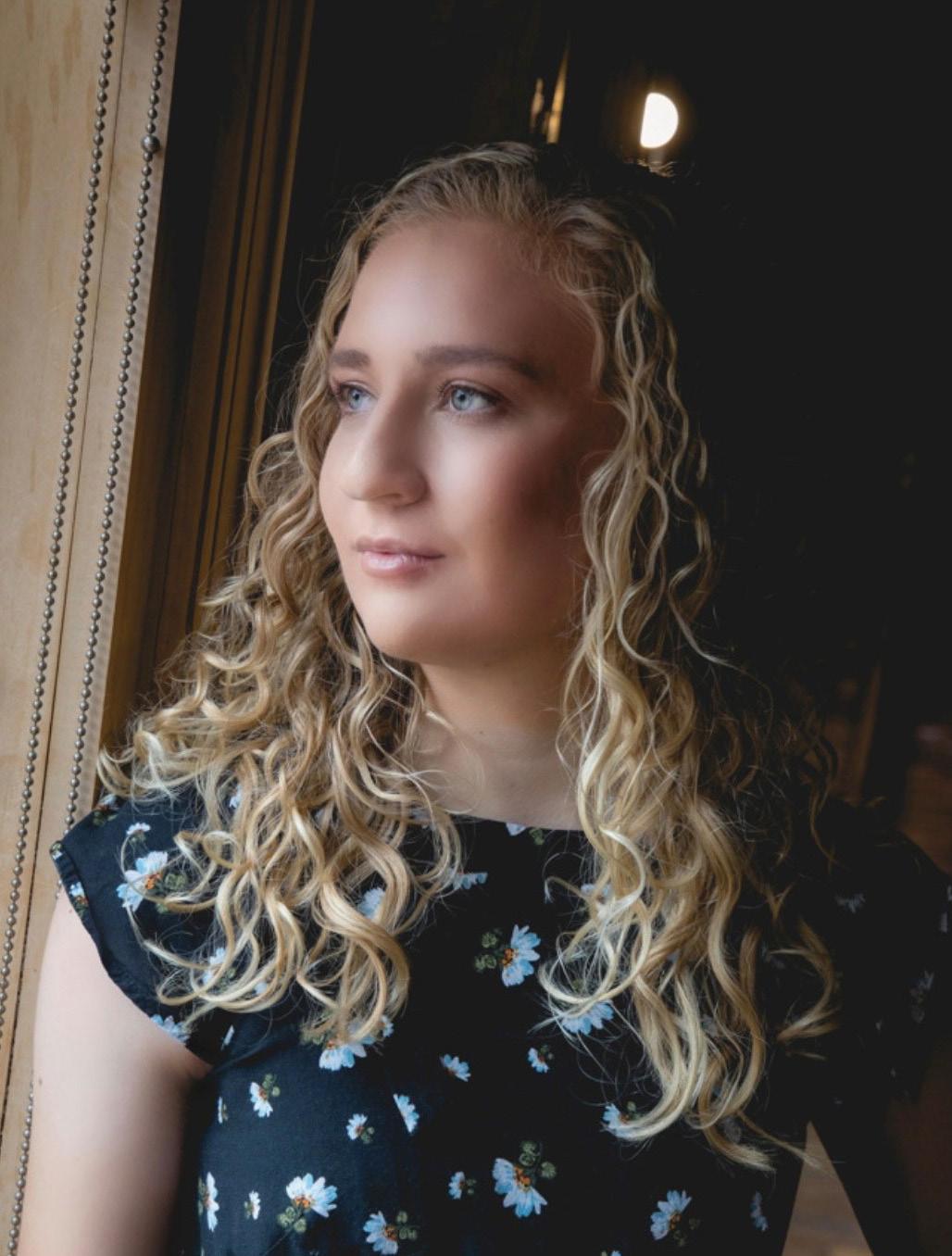
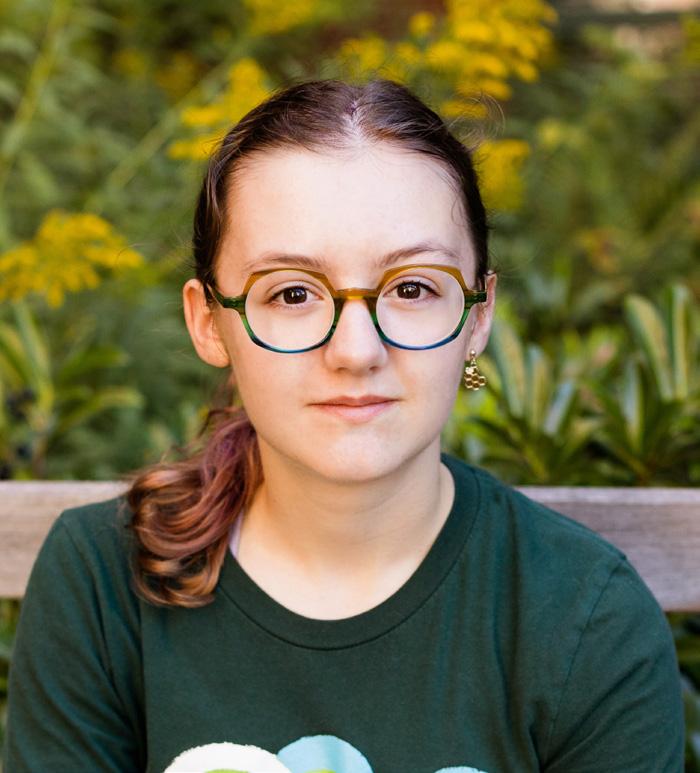
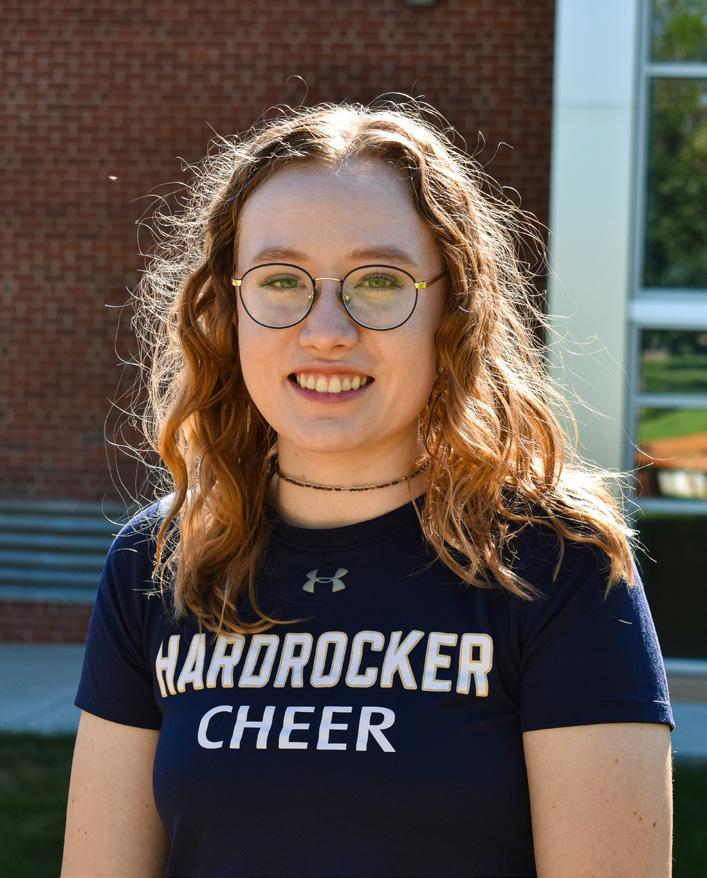






Hometown: Eugene, OR
School: University of Oregon
Major: Landscape Architecture
Brier Turnbull used her 2020 quarantine as an opportunity to learn a new, unique skill: beekeeping. She used creative problem-solving to overcome the obstacles a beginner beekeeper might face, like setting up a hive, treating mites, and harvesting honey. Brier plans to use that same creative mindset to pursue a career in urban planning. She knows the value of vegetation in a city as a solution to reducing air pollution and lowering city temperatures and wants to advocate for cities to implement urban growth boundaries and more sustainable expansion plans.
Hometown: Des Moines, IA
School: Iowa State University
Major: Human Physiology
From an early age, Grace Koch sought opportunities to volunteer with the elderly. She became an inhome elder caregiver and served those elderly in need in her community. She wants to help transform the way the world views elderly populations and educate younger generations about retirement and what it looks like to be an aging adult in America. Koch plans to use her degree to continue to care for others, particularly the elderly, and help them adjust to the transitions that life brings.
Hometown: Wiota, IA
School: Iowa State University
Major: Agricultural Studies
Nathan Behrends is a rapid, hands-on learner. During a study abroad trip to Costa Rica, Behrends was inspired to see a country that could provide enough resources for its entire population. He brought that inspiration back to his university courses and wants to use his career to collaborate and connect with farmers around the world to continue to develop precision farming. Behrends wants to help further sustainable practices in agriculture while continuing to increase yields as a solution to the growing need for food and biofuels around the world, and we’re happy to support him in his goals.
Hometown: Rowland Heights, CA
School: Washington University in St. Louis
Majors: Biochemistry and Healthcare Management
Rather than being defeated in the face of adversity and loss, Breanna Yang made the courageous decision to push forward and change the world. She founded Bryson’s Sunshine Foundation, a non-profit in honor of her brother’s memory, and channeled her determination into sharing Bryson’s story, raising money for pediatric cancer research, and carrying on Bryson’s legacy of generosity and care for others. Yang hopes to continue the latter by dedicating her career to pediatric oncology, where she can foster a practice of compassion and support for her patients and their families.
Hometown: Salem, SD
School: South Dakota State University
Major: Agricultural Communications
Already a passionate advocate, Ella Stiefvater dreams of using her communication skills to spread awareness about agriculture’s importance to America and the world. Her goal is to become an expert in ag communications, potentially becoming a news anchor or reporter. She understands that farmers and ranchers are not the only people that need to stay updated on new and advancing opportunities, and she wants to educate others on the vast potential of agriculture. Stiefvater already has the drive to get outside of her comfort zone to make a change — a trait that will take her far in her aspirations.
Hometown: Emery, SD School: South Dakota School of Mines and Technology Major: Biomedical Engineering
Innovation and leadership: two words that describe Mercedes Mesman. She gives her all, whether it is leading her SD Mines cheer leading team as their captain, working at her local hospital as a phlebotomist, or getting her biomedical engineering degree. Several members of Mesman’s family have congenital heart disorders. This has motivated her to get a master’s degree in biomedical engineering, so she can learn to develop artificial organs that are affordable and safe for those who need transplants. She is never satisfied in her desire to care for those who are most in need, especially those closest to her.
Hometown: Shoreline, WA School: Princeton University
Majors: Biomedical Engineering, Computer Science, and Public Policy
Driven to enact the change she wishes to see in the world, Yubi Mamiya is an ambassador for others. She created the “We the Future” exhibit providing students a place to make sustainability pledges and goals. Mamiya also represents her community as a King County Clean Water Youth Ambassador, an executive for the Washington Legislative Youth Advisory Council, and co-founder of the Washington Student Representatives Network. She had the opportunity to write and lobby legislation into law to provide mental health resources to Washington students. Mamiya plans to use her degrees and experience to connect those in need with high-quality healthcare services.
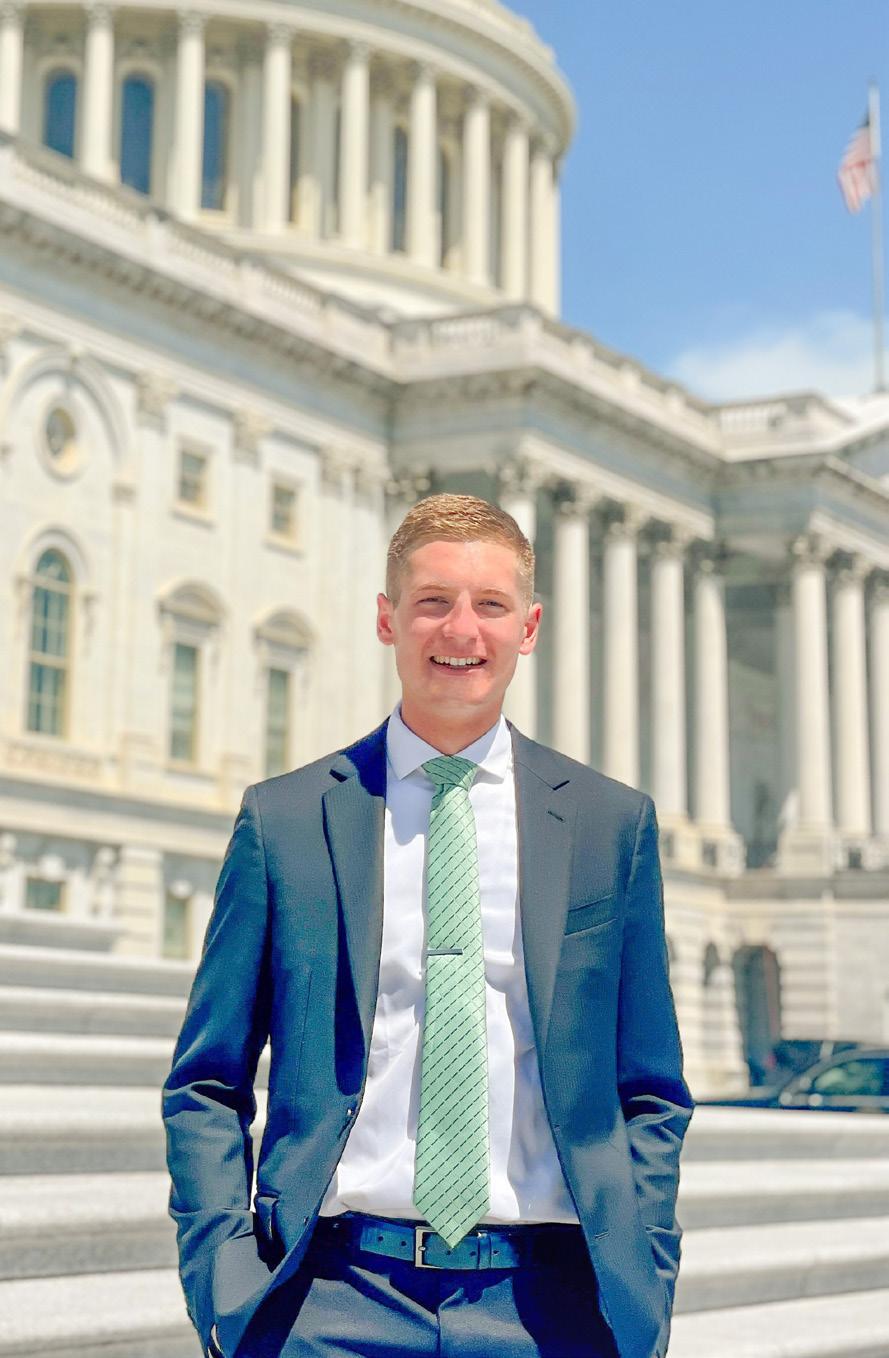




Hometown: Timnath, CO
School: South Dakota State University
Major: Agricultural and Biosystems Engineering
Dedicated to the development of precision agriculture practices, Justin Ackerman wants to expand the artificial photosynthesis process. An active member of South Dakota State’s School of Engineering club, Jackrabbit Baha team, and the Quarter Scale Tractor club, Ackerman is developing the skill set necessary to supplement agricultural practices with new, innovative technology. He wants to combine his love of farming with his passion for engineering and help farmers navigate the complexities that precision agriculture is bringing to modern-day farms.
Hometown: Sonoma, CA
School: University of California – Berkeley
Major: Environmental Engineering Science
Joseph Silvi takes sustainable living to the next level! From implementing a garden both for his family and his church to starting a compost pile for food waste to designing his own chemical reactor to make biodiesel from leftover vegetable oil to power his car, Silvi’s aspirations truly make him a force to be reckoned with. Devoted to caring for others and the planet, Silvi finds resourceful solutions to the challenges we face today right in his own backyard — and we can’t wait to see them implemented all over the world.
Hometown: Pella, IA
School: Dordt University
Major: Agricultural Studies
Having grown up on a farm, Ben Vos is well-versed in agriculture and conservation. A member of the Iowa Corn Growers Collegiate Advisory Team and the Iowa Soybean Association Soy Squad, Vos strives to be an advocate for agriculture and biofuels. He wants to educate others about the benefits of biofuels and, like POET, believes that agriculture is a key solution in the fight against climate change. He believes that individuals like himself can be catalysts that excite and educate others about the potential that farming has to continue to change the world, and we couldn’t agree more!







 By Scott Johnson, A Thinker of Thoughts (and POET Data Systems Administrator)
By Scott Johnson, A Thinker of Thoughts (and POET Data Systems Administrator)


Voting is both a right and a responsibility. And exercising our right to vote — in any capacity — is one of the joys and duties of being an American, even when it requires us to make difficult choices.
The year was 1993. I had just turned 18 a few months prior and felt the patriotic obligation to cast my vote for a critical upcoming election — the starters for the 1993 Major League Baseball All-Star Game.
In those days, if you attended a game leading up to the halfway point of the season, you were empowered with an official paper ballot of American League and National League representatives. You had the freedom to pick from any candidates on the ballot. However, there was an expectation that you were a well-educated fan of great virtue.
As a young, patriotic American, I saw this as an opportunity to make a real-world impact on society. My vote had the chance to determine which players were going to participate in baseball’s Midsummer Classic. An All-Star selection was a serious honor, only intended for the best of the best. It was a distinction that would forever be recorded on a player’s resume and a roster that would forever be etched in the history of Major League Baseball.
The All-Star ballot consisted of a handful of players at each position, somewhat scientifically determined. The American League shortstop list was composed of players predicted to lead their respective teams at the time of ballot printing. My team was, and still is, the Minnesota Twins. The Twins’ candidate, Shorty McStopperface, was their starting shortstop in 1992. (I don’t want to use his real name as I’m sure he is a big fan of this column, and I don’t want to offend him.) Shorty’s 1993 season was quickly derailed due to injuries.
At the time of voting, Shorty McStopperface had exactly two more hits in the Major League Baseball season than I had. These were obviously not All-Star-worthy credentials. But the ballots had already been printed, and therefore, Shorty was an official nominee to be chosen “best shortstop” for the American League.
There were several more qualified candidates that year than Mr. McStopperface. The obvious and most accomplished candidate was Cal Ripken Jr., a 10-time prior All-Star and future first-ballot Hall of Famer. Ripken had many, many more hits than I had in 1993. By any reasonable measure, he was indisputably the most skilled and most adept candidate to represent the American League at the most demanding and most important position in baseball.
Although I was a die-hard fan of the Twins, I knew it was my responsibility as a well-educated voting adult to pick the most qualified player. It was painful, but I honorably punched “C. Ripken'' out of my ballot. A feeling of calm came over me as I knew I had made the principled choice. I did what was right and what was best for the integrity of the game. I voted with my head. My heart would have to wait for the next election.
(Footnote: Kirby Puckett, centerfielder for my Minnesota Twins, was voted in as an All-Star and earned the 1993 All-Star game MVP award. Take that, Cal Ripken Jr.!)
POET’s next-generation protein product is a worldleading plant-based ingredient sourced from the highest-quality American corn. NexPro ® is a 50% protein ingredient derived from the dry-mill bioethanol production process. It’s high protein content and small particle size make it an ideal protein ingredient for a variety of markets including pet food, aquaculture, poultry, swine and dairy.

